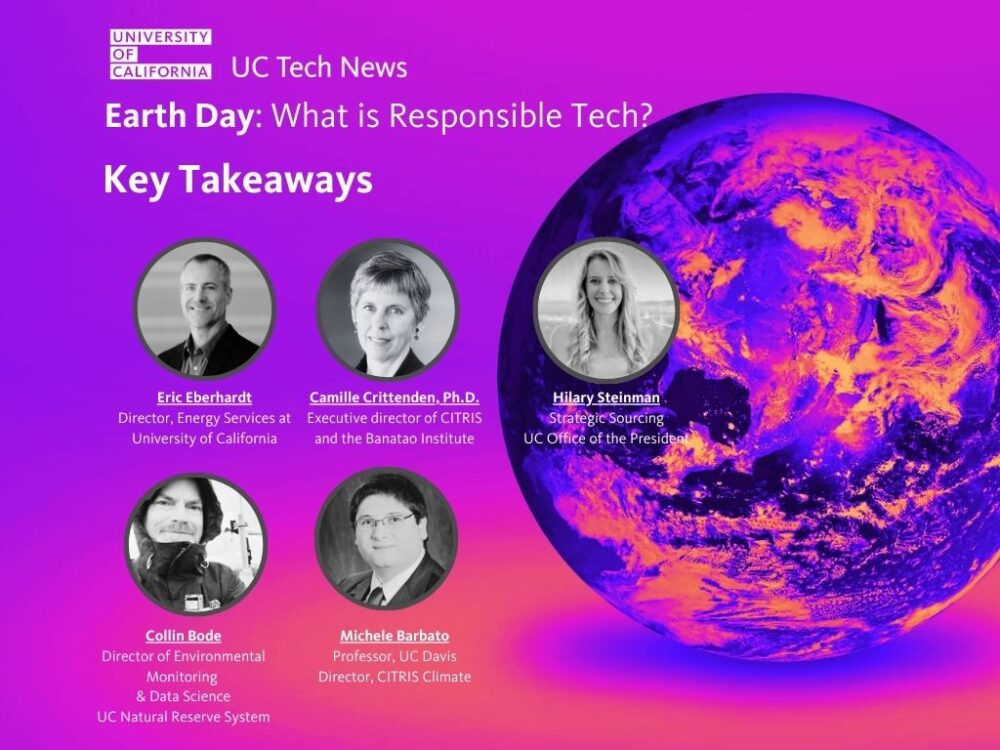Technology and innovation play an increasingly important role in shaping solutions for sustainability. Key figures from the University of California system recently gathered with the UC Tech community* and shared their insights from the perspectives of research, commercialization, administration and policy. UC Tech community staff and supporters learned how these domains intersect, how they affect UC tech staff and others and what members of the UC tech community can do to drive success.
Actions UC Tech staff can Take to Support Sustainability Efforts
- Collaborate with Energy Managers: Eric Eberhardt emphasized the importance of engaging with local energy managers early in the process of planning energy-intensive projects, like data centers, to optimize energy efficiency and ensure alignment with sustainability goals.
- Adopt Sustainable Procurement Practices: Hilary Steinman outlined the need for UC campuses to continue to follow sustainable procurement guidelines, such as selecting products with Energy Star certifications and to continue to abide by the UC Supplier Code of Conduct, which mandates environmental impact standards for suppliers.
- Leverage AI for Energy and Sustainability: Both Camille Crittenden and Michele Barbato highlighted how AI can be used to enhance sustainability efforts, including improving energy efficiency in buildings and assisting in tasks like wildfire risk assessment and crop harvesting. However, they also stressed the need for further research to improve the energy efficiency of AI technologies.
- Support Long-Term Environmental Monitoring: Collin Bode advocated for the use of machine learning, IoT, and edge computing to enhance environmental monitoring, which will enable faster and more efficient data collection, especially in remote locations where biodiversity and climate data are critical.
- Strengthen Partnerships with Industry: Michele Barbato emphasized the need to strengthen relationships with the private sector to secure funding for climate adaptation and sustainability projects, underscoring the importance of collaboration beyond academic research.
- Promote Eco-Friendly Tech Choices: Camille Crittenden called for the tech community to prioritize responsible AI development and advocate for public education on green data centers and metrics of energy and water consumption in high performance computing.
- Track and Report Supplier Emissions: Hilary Steinman stressed the need for technologies like EcoVadis to help track and report on supplier emissions and sustainability certifications, especially as the UC system works to reduce its carbon footprint throughout its supply chain.
Driving Sustainability Forward: What UC Colleagues are Doing Across Domains
Camille Crittenden: IT Research for Societal Benefit
Camille Crittenden, Executive Director of CITRIS* and the Banatao Institute, discussed the center’s mission to drive IT research for societal good. CITRIS, spanning multiple UC campuses, focuses on diverse fields such as aviation, health, tech policy, and climate. Notably, Crittenden highlighted CITRIS’s contributions to sustainability, including collaborations on energy efficiency and climate resilience, such as work with the California Energy Commission and the Yuba Water Agency.
One of the challenges Crittenden pointed to was the environmental impact of AI, particularly the significant energy demands of large data centers. She stressed that while AI holds promise for solving environmental issues, its rapid growth must be accompanied by strategies to optimize energy use. This includes efforts to improve data center architecture and AI algorithms, as well as legislative actions in California to regulate energy consumption by AI technologies.
Crittenden emphasized the role of the tech community in promoting responsible AI development, advocating for public education on sustainable technology choices.
“Our focus is on IT research in the interest of society, and in particular, how technology can drive solutions for climate resilience and sustainability.”
Camille Crittendon
Michele Barbato: Enhancing Infrastructure Resilience
Michele Barbato, Director of the CITRIS Climate Initiative and a UC Davis professor, shared his efforts to enhance infrastructure resilience against climate-driven hazards. Barbato’s initiatives include projects like the Oakland EcoBlock, which aims to electrify a neighborhood and create energy-sharing systems for improved resilience, especially in the face of disasters like wildfires.
Barbato highlighted AI’s potential in sustainability, from optimizing crop harvesting to improving wildfire risk assessment. Yet, he also acknowledged the environmental costs of new technologies, urging further research to make them more energy-efficient. He mphasized the need for creative funding solutions and strengthened collaborations to address climate challenges.
“We need to look at these as an opportunity to strengthen our relationship with the private sector and industry partnerships.”
Michele Barbato
Collin Bode: Advancing Environmental Monitoring with Data Science
Collin Bode, Director of Environmental Monitoring and Data Science for the UC Natural Reserve System, outlined his team’s role in advancing climate monitoring through technology. Bode’s team operates over 50 climate monitoring stations across California and uses machine learning to streamline biodiversity monitoring. By integrating AI and edge computing, Bode’s group is able to process data faster and more accurately, identifying species and assessing habitat quality in real-time.
Bode also advocated for incorporating human health metrics into environmental monitoring, inspired by the One Health initiative, which connects human, animal, and environmental health. This integration could provide valuable insights into how environmental changes impact human health.
“We aim to leverage existing technologies—IoT, machine learning, and edge computing—to scale up biodiversity monitoring efficiently, making the process faster, smarter, and more sustainable.”
Collin Bode
Eric Eberhardt: Energy Efficiency and Clean Energy Innovation
Eric Eberhardt, Director of Energy Services at UCOP, highlighted the importance of energy efficiency and clean energy initiatives across the UC system. Eberhardt’s team has overseen over 1,200 energy efficiency projects, saving more than $500 million and preventing over 3 million metric tons of carbon emissions. He also pointed out the challenge of meeting the growing energy demands of technologies like AI while ensuring the energy comes from renewable sources.
Eberhardt emphasized the potential of AI to optimize building systems and improve energy efficiency. Through machine learning, AI can optimize HVAC systems and lighting, ensuring that energy is used efficiently during times when renewable energy is abundant..”
“By integrating energy considerations into the planning stages of projects, we can maximize their environmental benefits and ensure they align with UC’s sustainability goal.”
Eric Eberhardt
Hilary Steinman: Sustainable Procurement and Supply Chain Management
Hilary Steinman, Senior Category Manager at UC Office of the President, shared her work in sustainable procurement, focusing on integrating sustainability practices into the university’s supply chain. Steinman’s team has introduced initiatives like the Supplier Code of Conduct, which requires suppliers to minimize their environmental impact. This includes waste reduction and investment in cleaner technologies.
Steinman discussed the challenges of tracking and managing emissions from suppliers, especially those outside UC’s direct control. She highlighted tools like EcoVadis, which help track supplier sustainability certifications and emissions.
“We’re really going to have to do that in tandem [with new technologies] if we’re going to be tracking the supply chain, these additional steps removed from our direct carbon footprint as an organization.”
Hilary Steinman
Grateful for this discussion and looking forward to learning from other researchers and operators at the university
The UC Tech community thanks the panelists for taking time to discuss their respective angles on sustainability – from researching new technologies to prevent fires, and use energy more efficiently in a site in downtown Oakland, to applications of existing technologies to make wildlife detection possible at a scale that was never before imagined. We were also fascinated to learn more about how UC operators and administrators are tracking their progress towards increased energy efficiency and the role that AI plays in all of this, sometimes a cause for concern as energy use increases, and how this challenge is being addressed from an operational and regulatory standpoint. We look forward to continuing the conversation and invite other members of the community to contact UC Tech News to share your progress in this domain.
Related Reading
- Camille Crittenden shared:
- Michele Barbato shared:
- Collin Bode shared:
- UC Natural Reserve System (Sign up for the monthly newsletter)
- Dendra Science: a real-time sensor management system
- Eric Eberhardt shared:
- Hilary Steinman shared:
About the featured guests
Michele Barbato
Professor, University of California, Davis; Director, CITRIS Climate; Director, UC Davis Climate Adaptation Research Center
Collin Bode
Director of Environmental Monitoring & Data Science
UC Natural Reserve System
Camille Crittenden, Ph.D.
Executive director of CITRIS and the Banatao Institute
Co-founder of the CITRIS Policy Lab and the Women in Tech Initiative at UC
Eric Eberhardt
Director, Energy Services at University of California
UC Office of the President
Strategic Sourcing
UC Office of the President
** CITRIS stands for: Center for Information Technology Research in the Interest of Society
* UC Tech Community – 20,000 people supporting tech at UC, including about 10,000 IT staff and others supporting tech at the university, from vendors and faculty to students and their parents. All are welcome to subscribe and join many of our group discussions. Our work includes many of the systemwide innovations celebrated each year during the UC Tech Awards ceremony, an annual conference, and monthly, weekly and daily opportunities to exchange information in smaller communities using tools like webinars, social media, group chats, a landing page and weekly newsletter, and more.







